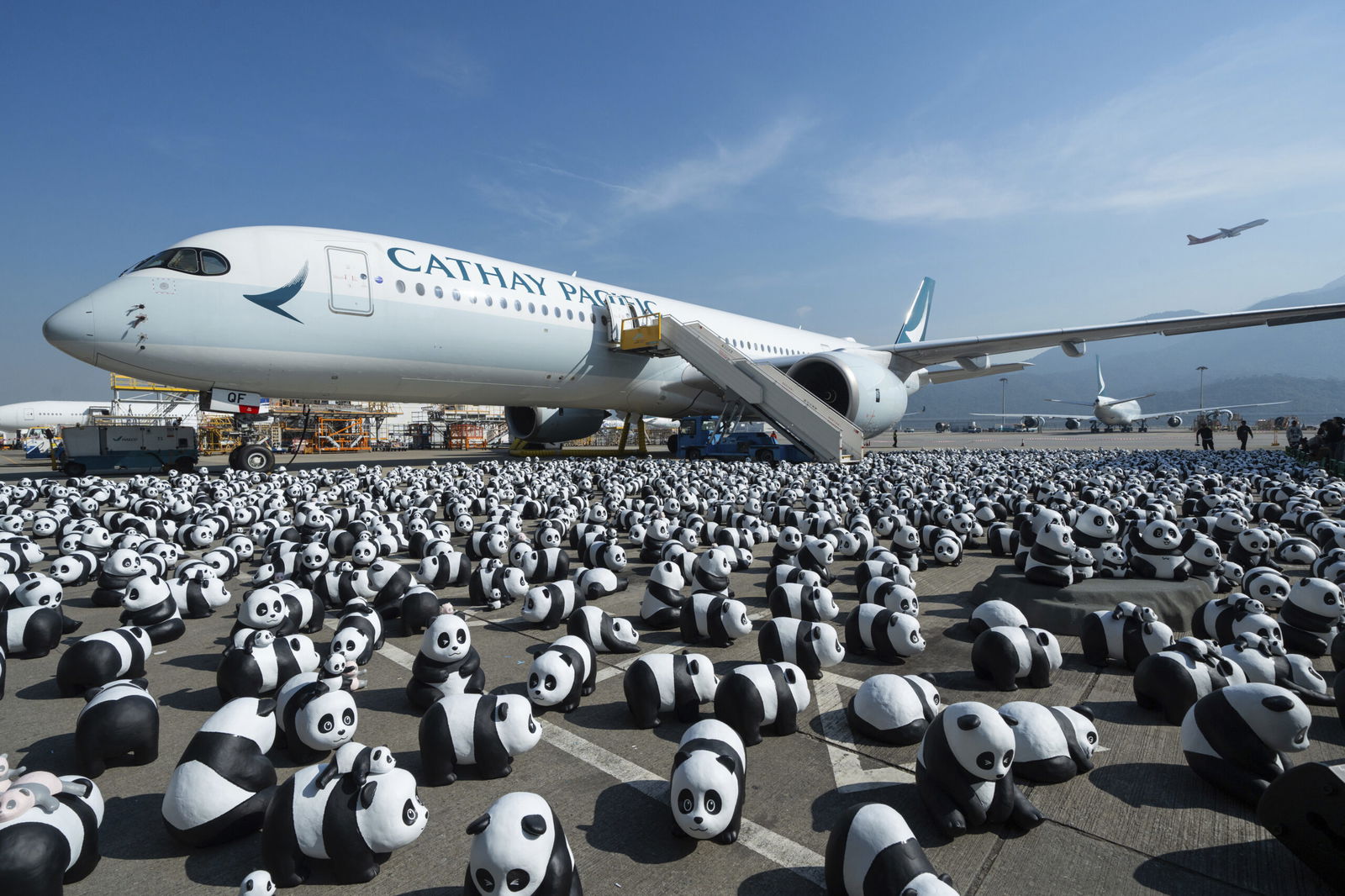Around the World briefs

By Associated Press
Hong Kong will display 2,500
panda sculptures to capitalize
on a local bear craze
HONG KONG | Thousands of giant panda sculptures will greet residents and tourists starting Saturday in Hong Kong, where enthusiasm for the bears has grown since two cubs were born in a local theme park.
The 2,500 exhibits were showcased in a launch ceremony of PANDA GO! FEST HK, the city’s largest panda-themed exhibition, at Hong Kong’s airport on Monday. They will be publicly displayed at the Avenue of Stars in Tsim Sha Tsui, a popular shopping district, this weekend before setting their footprint at three other locations this month.
One designated spot is Ocean Park, home to the twin cubs, their parents and two other pandas gifted by Beijing this year. The design of six of the sculptures, made of recycled rubber barrels and resins among other materials, was inspired by these bears.
The cubs — whose birth in August made their mother Ying Ying the world’s oldest first-time panda mom — may meet visitors as early as February.
In a separate media preview event on Monday, the new pair of Beijing-gifted pandas, An An and Ke Ke, who arrived in September, appeared relaxed in their new home at Ocean Park. An An enjoyed eating bamboo in front of the cameras and Ke Ke climbed on an installation. They are set to meet the public on Sunday.
The displays reflect Hong Kong’s use of pandas to boost its economy as the Chinese financial hub works to regain its position as one of Asia’s top tourism destinations.
Pandas are considered China’s unofficial national mascot. The country’s giant panda loan program with overseas zoos has long been seen as a tool of Beijing’s soft-power diplomacy.
Hong Kong’s tourism industry representatives are upbeat about the potential impact of housing six pandas, hoping to boost visitor numbers even though caring for pandas in captivity is expensive. Officials have encouraged businesses to capitalize on the popularity of the bears to seize opportunities in what some lawmakers have dubbed the “panda economy.”
The organizer of the exhibitions also invited some renowned figures, including musician Pharrell Williams, to create special-edition panda designs. Most of these special sculptures will be auctioned online for charity and the proceeds will be donated to Ocean Park to support giant panda conversation efforts.
Ying Ying and the twin cubs’ father, Le Le, are the second pair of pandas gifted by Beijing to Hong Kong since the former British colony returned to China’s rule in 1997.
The first pair were An An and Jia Jia who arrived in 1999. Jia Jia, who died at 38 in 2016, is the world’s oldest-ever panda to have lived in captivity.
The average lifespan for a panda in the wild is 14 to 20 years, while in captivity it’s up to 30 years, according to the World Wide Fund for Nature.
Police recover a stolen van with
2,500 pies after a chef’s appeal,
but they are too damaged to eat
LONDON | A British chef’s appeal for thieves to return 2,500 pies that were in a stolen van ended in disappointment Tuesday when police found the vehicle abandoned, with its savory cargo too damaged to eat.
Tommy Banks, who owns two Michelin-starred restaurants and a pub in the northern English county of Yorkshire, said a member of staff discovered the van was missing, along with its cargo of steak and ale, turkey and butternut squash pies intended for a Christmas market in the city of York. The food has been valued at 25,000 pounds ($32,000).
Banks said the van was insured, but he implored the vehicle thieves not to let the food go to waste. In an Instagram video, he suggested they “do the right thing” and drop the pies at a community center or other venue.
In an update, Banks said police had found the van, badly damaged and with stolen license plates, in Middlesbrough, about 30 miles from where it was taken. He said the pies were still inside but were damaged and would have to be discarded.
“It’s just so much waste. It’s just rubbish,” Banks said in a video on Instagram. “Sorry, it’s not a happier ending to this story.”
The pie heist is the latest theft of artisanal edibles to rock the U.K. food trade. In October, nearly 1,000 wheels of cloth-wrapped artisanal cheddar weighing 22 metric tons (48,488 pounds) and valued at 300,000 pounds ($390,000) were swiped from London’s Neal’s Yard Dairy by a con artist posing as a wholesale distributor for a major French retailer.
Despite a hunt by British and international police — and an appeal by TV chef Jamie Oliver — the cheese has not been found. A 63-year-old man was arrested and questioned by police, but has not been charged.
Notre Dame’s reopening will have solemn rituals, grand opera,
heads of state and high security
PARIS | The reopening of Notre Dame this coming weekend is going to be a high-security affair, with a repeat of some measures used during the Paris Olympics and the sealing-off to tourists of the cathedral’s island location in the heart of the French capital.
After more than five years of reconstruction following the fire that devastated Notre Dame in 2019, invite-only ceremonies Saturday and Sunday will usher in its rebirth.
Police chief Laurent Nuñez said only people with invitations and the island’s residents will have access to the Ile de la Cité in the middle of the River Seine, which includes Notre Dame and habitually hums with tourists.
He said about 50 heads of state and government are expected and that security arrangements are drawing on the police measures that sealed off large sections of central Paris for the Paris Games’ flamboyant opening ceremony.
“A very high level of security will be applied,” Nuñez said in an interview published Monday in Le Parisien.
President-elect Donald Trump said late Monday that he would be attending the reopening celebration. The 2019 fire occurred during Trump’s first term as U.S. president.
Archbishop to bang on the doors
The first celebrations starting Saturday afternoon will blend religious ritual and showbiz. Paris Archbishop Laurent Ulrich will preside at a reopening service, banging on Notre Dame’s shuttered doors with his staff to reopen them, the cathedral website says.
The archbishop will also symbolically reawaken Notre Dame’s thunderous grand organ. The fire that melted the cathedral’s lead roofing coated the huge instrument in toxic dust. Its 8,000 pipes, ranging in size from that of a pen to over 10 meters (33 feet) tall, have been painstakingly disassembled, cleaned, and retuned.
There will also be psalms, prayers and singing. French President Emmanuel Macron will attend and address the VIP guests.
A musical show
After the service, opera singers Pretty Yende, from South Africa, and Julie Fuchs, from France; Chinese pianist Lang Lang; cellist Yo-Yo Ma; Benin-born singer Angelique Kidjo; Lebanese singer Hiba Tawaji and others will perform at a concert Saturday evening for the cathedral and those who took part in the reconstruction, says the show’s broadcaster, France Télévisions.
The security cordon sealing off the whole of the Ile de La Cité, plus a stretch of the Seine’s southern bank and nine of its bridges, will be in place from early Saturday evening to Sunday night, the police chief said. Only those involved in the ceremonies and residents will be granted access, he said. All shops on the island — many are geared to the tourist trade — as well as boat tours that start and stop there will be closed for the weekend, he added.
Sunday Mass and buffet
The Paris archbishop will also lead an inaugural Mass and consecration of the new altar on Sunday morning.
Nearly 170 bishops from France and other countries will join the celebration, as well as priests from all 106 parishes in the Paris diocese, the cathedral website says.
It says Mass will be followed by a “fraternal buffet” for the needy.
Public viewing areas capable of holding 40,000 people will be set up on the Seine’s southern bank, so spectators can follow the two days of events on screens, the police chief said.
Negotiators fail to reach an agreement on a plastic pollution treaty. Talks to resume next year
BUSAN, South Korea | Negotiators working on a treaty to address the global crisis of plastic pollution for a week in South Korea won’t reach an agreement and plan to resume the talks next year.
They are at an impasse over whether the treaty should reduce the total plastic on Earth and put global, legally binding controls on toxic chemicals used to make plastics.
The negotiations in Busan, South Korea, were supposed to be the fifth and final round to produce the first legally binding treaty on plastics pollution, including in the oceans, by the end of 2024. But with time running out early Monday, negotiators agreed to resume the talks next year. They don’t yet have firm plans.
More than 100 countries want the treaty to limit production as well as tackle cleanup and recycling, and many have said that is essential to address chemicals of concern. But for some plastic-producing and oil and gas countries, that crosses a red line.
For any proposal to make it into the treaty, every nation must agree to it. Some countries sought to change the process so decisions could be made with a vote if consensus couldn’t be reached and the process was paralyzed. India, Saudi Arabia, Iran, Kuwait and others opposed changing it, arguing consensus is vital to an inclusive, effective treaty.
On Sunday, the last scheduled day of talks, the treaty draft still had multiple options for several key sections. Some delegates and environmental organizations said it had become too watered down, including negotiators from Africa who said they would rather leave Busan without a treaty than with a weak one.
Every year, the world produces more than 400 million tons of new plastic. Plastic production could climb about 70% by 2040 without policy changes.
In Ghana, communities, bodies of water, drains and farmlands are choked with plastics, and dumping sites full of plastics are always on fire, said Sam Adu-Kumi, the country’s lead negotiator.
“We want a treaty that will be able to solve it,” he said in an interview. “Otherwise we will go without it and come and fight another time.”
At Sunday night’s meeting, Luis Vayas Valdivieso, the committee chair from Ecuador, said that while they made progress in Busan, their work is far from complete and they must be pragmatic. He said countries were the furthest apart on proposals about problematic plastics and chemicals of concern, plastic production and financing the treaty, as well as the treaty principles.
Valdivieso said the meeting should be suspended and resume at a later date. Many countries then reflected on what they must see in the treaty moving forward.
Rwanda’s lead negotiator, Juliet Kabera, said she spoke on behalf of 85 countries in insisting that the treaty be ambitious throughout, fit for purpose and not built to fail, for the benefit of current and future generations. She asked everyone who supported the statement to “stand up for ambition.” Country delegates and many in the audience stood, clapping.
Panama’s delegation, which led an effort to include plastic production in the treaty, said they would return stronger, louder and more determined.
Saudi Arabia’s negotiator said chemicals and plastic production are not within the scope of the treaty. Speaking on behalf of the Arab group, he said if the world addresses plastic pollution, there should be no problem producing plastic. Kuwait’s negotiator echoed that, saying the objective is to end plastic pollution, not plastic itself, and stretching the mandate beyond its original intent erodes trust and goodwill.
In March 2022, 175 nations agreed to make the first legally binding treaty on plastics pollution, including in the oceans, by the end of 2024. The resolution states that nations will develop an international legally binding instrument on plastic pollution based on a comprehensive approach that addresses the full life cycle of plastic.
Stewart Harris, a spokesperson for the International Council of Chemical Associations, said it was an incredibly ambitious timeline. He said the ICCA is hopeful governments can reach an agreement with just a little more time.
Most of the negotiations in Busan took place behind closed doors. Environmental groups, Indigenous leaders, communities impacted by plastic pollution and scientists who traveled to Busan to help shape the treaty said it should’ve been transparent and they felt silenced.
“To a large degree, this is why the negotiation process is failing,” said Bjorn Beeler, international coordinator for the International Pollutants Elimination Network. “Busan proved that the process is broken and just hobbling along.”
South Korea’s foreign affairs minister Cho Tae-yul said that though they didn’t get a treaty in Busan as many had hoped, their efforts brought the world closer to a unified solution to ending global plastic pollution.
—From AP reports


